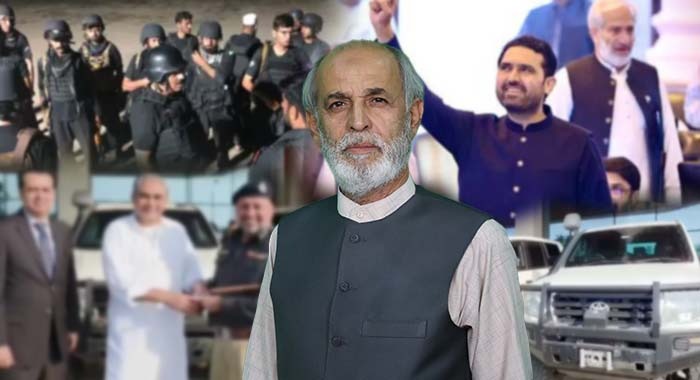Shamim Shahid
The controversy over the return of bulletproof vehicles by the Khyber Pakhtunkhwa (KP) government has once again exposed the widening gap between the federal and provincial authorities a rift that continues to weaken Pakistan’s collective fight against terrorism. What began as a routine administrative matter has now evolved into a political flashpoint, revealing the fragility of intergovernmental coordination in one of the most sensitive provinces of the country.
According to reports, the KP Police had formally requested the federal government through Interior Minister Mohsin Naqvi to provide bulletproof vehicles and other security equipment to help the province’s law enforcement agencies deal with the mounting wave of terrorism. The province remains on the frontline of Pakistan’s war against militancy, facing near-daily threats from extremist groups operating in the tribal districts and adjoining areas.
However, when the vehicles were finally distributed, Chief Minister Khyber Pakhtunkhwa reportedly decided to return them. The official justification was that the vehicles were old, of poor quality, and unfit for operational use. Yet, political observers and insiders view the decision as less about logistics and more about politics a symptom of deep mistrust between Peshawar and Islamabad.
Analysts believe that the decision reflects an unfortunate trend where political considerations override national security needs. Many have described the episode as “political diplomacy” gone wrong where gestures of defiance are valued more than cooperation. Refusing to meet or engage with federal officials, including representatives and journalists from Balochistan who accompanied the federal delegation, was seen by many as contrary to the traditions of Khyber Pakhtunkhwa, where hospitality and dialogue have long been considered virtues of governance.
“If there were questions or concerns about the vehicles, they should have been discussed openly,” said a senior analyst. “Even a symbolic meeting or courteous exchange would have upheld the province’s traditions. Turning away guests especially in such a sensitive context only reinforces political polarization.”
Complicating the matter further are reports suggesting that the vehicles in question were not purchased by the federal government but were part of a batch donated to Pakistan by the United Nations. If true, this raises not only procedural questions but also diplomatic concerns. Returning UN-donated vehicles, regardless of their condition, could be interpreted as a rejection of international assistance at a time when Pakistan’s counterterrorism efforts rely heavily on external support and collaboration.
“The vehicles may have been old, but they were a UN contribution,” said another commentator. “Returning them was unnecessary and symbolically damaging. It sent the wrong message that politics is taking precedence over pragmatism.”
Despite limited resources, the KP Police continue to fight valiantly against terrorism. In the first nine months of this year alone, the province witnessed over a thousand terrorist incidents, resulting in more than 170 fatalities. These figures represent not just statistics but the immense human and institutional cost of the ongoing conflict.
Police officials in the province have repeatedly highlighted the shortage of basic operational equipment including bulletproof vehicles, advanced firearms, night-vision devices, and armored personnel carriers (APCs). In many districts, even senior officers lack secure transport, leaving them vulnerable to ambushes and targeted attacks.
“The KP Police are fighting with exceptional courage,” said a former law enforcement officer. “But they cannot continue to bear the brunt of terrorism without adequate support from the federation. This is not a provincial issue it is a national one.”
Historically, Pakistan’s counterterrorism success has depended on coordination between the federation and the provinces. During the PPP-PML-N coalition period from 2008 to 2013, and later between the PTI government in KP and the PML-N government in the Centre from 2013 to 2018, institutional engagement remained functional despite political differences. Then-Chief Minister Pervez Khattak and former Prime Minister Nawaz Sharif often maintained professional communication channels, understanding that security cooperation transcended party lines.
That spirit of cooperative federalism now appears lost. The current political environment is marked by confrontation rather than consultation, and the recent dispute over vehicles epitomizes this dangerous drift.
The federal and provincial governments must recognize that terrorism does not discriminate by political affiliation. Every attack in Khyber Pakhtunkhwa — from Peshawar to Waziristan — is an assault on Pakistan’s stability. Administrative disconnects, whether over vehicles or meetings, only embolden the very forces that thrive on disunity and distrust.
The need of the hour is clear: genuine dialogue, depoliticized coordination, and shared responsibility. Khyber Pakhtunkhwa’s police and security agencies have shown remarkable endurance under pressure. They deserve not political gestures but practical support.
The rejection of bulletproof vehicles may seem like a small act in isolation, but in the broader context, it reflects a dangerous mindset one that prioritizes political point-scoring over national security. Unless the federal and provincial governments bridge their growing divide, the cost will not be political it will be paid in lives.
To watch the podcast click on link: https://www.youtube.com/watch?v=ICEcefZaMHU





